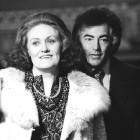Joan Sutherland Suggest updates
Born Sydney, 7 November 1926.
Died Les Avants, Switzerland, 10 October 2010.
Australian soprano.
Studies
Sydney Conservatory, then, in London, at the Royal College of Music with Clive Carey.
Honours
CBE (1961); AC (1975); DBE (1978); OM (1991).
Performances of opera
Dame Joan Sutherland enjoyed one of the most phenomenally successful careers of any opera singer in the second half of the 20th century. Her largest area of specialisation was in the bel canto tradition of works by Donizetti (including Lucia di Lammermoor, Maria Stuarda, Anna Bolena, La fille du régiment) and Bellini (Norma, I puritani, La sonnambula). However she also sang many French operas and was an early advocate of the operas of Handel and other 18th century masters whose works had fallen into neglect. In later years she also used her gift for comedy in performances of operetta.
She joined the Covent Garden Company in 1951, beginning with small roles such as First Lady in The Magic Flute. At this stage it was assumed that her tall physique and powerful voice would produce a career concentrating on Wagner. However, when she sang Clotilde in Norma and the Priestess in Aïda, in performances where she could watch Callas, who took the title roles, she realised that a voice as large as hers could also be effective in the bel canto repertoire. Her friend, coach, and later husband, the Australian pianist Richard Bonynge, had been trying to convince her of this. During the 1950s she sang a number of leading roles with the company, either in London or on the extensive British tours which Covent Garden undertook in those days. These included Amelia (Un ballo in maschera), Countess (The Marriage of Figaro), Eva (The Mastersingers), Olympia, Antonia and Giulietta in The Tales of Hoffmann, Agathe Der Freischütz, and the title role in Aïda. She also appeared in some new works, taking over the role of Essex’s sister, Lady Rich, from its creator, Jennifer Vyvyan (Britten’s Gloriana 1953). In 1958 she sang Madame Lidoine in the British premiere of Poulenc’s Dialogues of the Carmelites. Most importantly, she created the part of Jenifer in The Midsummer Marriage (Tippett 1955), a live recording of which has been preserved.
In 1959, Covent Garden mounted a new production of Lucia di Lammermoor, conducted by Tullio Serafin and directed and designed by Franco Zeffirelli. The result was sensationally successful and launched Sutherland on her international career which continued with unparalleled success for the next thirty years, with regular appearances in all the world’s major opera houses. Unlike some leading singers of the past, she thrived on performing with the best available talent, and Pavarotti always credited her with teaching him the proper technique which allowed his own career to develop.
In Scotland, Sutherland appeared as a star performer in three major stagings at the Edinburgh Festival. In 1960 she was Elvira in the Glyndebourne production of I puritani, and the following year sang Lucia with Covent Garden (though Zeffirelli’s spectacular sets had to be much simplified to fit the King’s Theatre stage, and her own ill-health meant that she had to withdraw from the run). In 1967 she appeared as Euridice in Haydn’s L’anima del filosofo (marketed under its alternative title as Orfeo ed Euridice). In 1953 she had toured to Edinburgh and Glasgow as Amelia and Countess Almaviva. She also sang concerts in Scotland, including a Verdi Requiem under Giulini at the 1960 Festival and as late as 1987 she made appearances with the Scottish Chamber Orchestra.
Recordings
Sutherland made a vast number of recordings of complete operas, including several which she did not sing in the theatre. Particularly notable examples include her second version of Lucia with Pavarotti, The Tales of Hoffmann with Domingo, and a great rarity which she and her husband rescued from oblivion, Massenet’s Esclarmonde. Her first recital disc remains very special, including Lucia’s mad scene.
Roles in Scotland
- Countess Almaviva
-
Nozze di Figaro 1953
- Amelia wife of Anckarström (Adelia)
-
Masked Ball 1953
- Priestess
-
Aïda 1953
- Giulietta a courtesan
-
Tales of Hoffmann 1955
- Elvira daughter of Lord Walton
-
Puritani 1960
- Lucia Lucy Ashton, Henry's Sister
-
Lucia di Lammermoor 1961
- Euridice
-
Anima del Filosofo 1967

